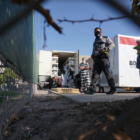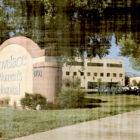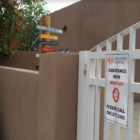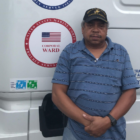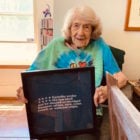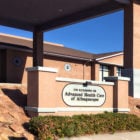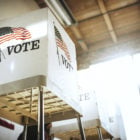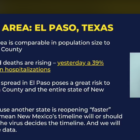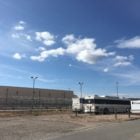Images show reality in El Paso that must be seen
|
Workers and guards outside an El Paso mobile morgue during the COVID-19 pandemic. Claudia Silva/New Mexico In Depth
It felt surreal pulling into the cemetery next to the University Medical Center of El Paso. Large trailers with doors flung wide open are lined up outside the medical examiner’s office tucked away just down the street. The trailers house rows of shelves holding the overflow of those who have died of COVID-19. As Texas has reached over 1 million cases, the border city of El Paso has become a hot-spot, some calling it the new New York, with one of every 20 to 30 people estimated to be positive.
As the situation has worsened the city’s prisoners have been asked to help handle the dead.
